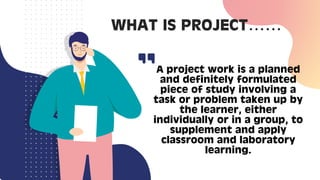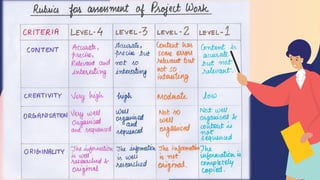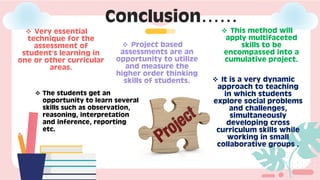PROJECT WORK: TOOLS AND TECHNIQUES FOR ASSESSMENT
- 1. ASSESSMENT FOR LEARNING-II TOPIC: PROJECT WORK ADITYA ARYA B.SC.B.ED {CBZ} 5 SEMESTER
- 2. CONTENTS: ❖WHAT IS PROJECT ❖TYPES OF PROJECT ❖USES OF PROJECT ❖HOW WOULD WE ASSESS IT ❖RUBRIC FOR THE ASSESSMENT OF PROJECT ❖ROLE OF THE TEACHER ❖MERITS OF PROJECT METHOD ❖DEMERITS OF PROJECT METHOD ❖CONCLUSION
- 3. A project work is a planned and definitely formulated piece of study involving a task or problem taken up by the learner, either individually or in a group, to supplement and apply classroom and laboratory learning. WHAT IS PROJECT……
- 4. ❖ Project reflects about the knowledge and understanding of students reached on one or the other concepts and principles of other curricular arears. Project work attempts to promote problem solving, creativity and spirit of enquiry in the content. ❖ Project is the modern method in which students shows his creativity in designing the content of the studies. ❖ It follows the approach of Learning by Doing and Learning by Living. WHAT IS PROJECT……
- 5. - in which the emphasis is given on actual construction of material such as model making. Practical tasks - in this type direct or vicarious experiences, such as reading or listening stories etc. are involved. Appreciation - in which the purpose is to solve a problem involving the intellectual processes. - in which the emphasis is aimed to attain a certain degree of skill such as laboratory demonstrations directly from either the textbooks or laboratory manuals. Problem-solving Master of a skill, knowledge TYPES OF PROJECT…. Project work is a more or less open-ended activity and depends on the nature of the task. The nature of a project work may be cateogarized on the basis of tasks involved;
- 6. USES OF PROJECT…. ❖Project work allows students to think beyond the limits of classroom and develop among them various skills, behaviours, inquisitiveness and confidence. ❖The project work aims to apply students’ knowledge and understanding daily life problems, promotes habit of critical thinking and helps the students to adopt the scientific method of working. ❖Providing learning environments that allows students to question, analyze, evaluate leads them to higher-order thinking. ❖The learning that occurs during the process of project work assesses the skills of collaboration, problem-solving, decision making, and communication. ❖Students also learn to plan and execute their ideas within a given timeframe.
- 7. How would we assess it…… It is linked with all the three aspects namely : The content The process The product Assessment doesn’t happen at the end of the task or unit. We should give multiple opportunities to students to reflect on their learning. We should not forget that assessing the project is equally important that of assessing student’s achievements. For assessing a project, we may develop a rubric.
- 9. ROLE OF THE TEACHER….. ✓ As a teacher, we have to assess work quality and understanding of students throughout the project-building process. ✓ In project based evaluation method, we as a teacher should also play the role of a guide, a mentor, so that students will not deviate from the topic. ✓ We have to encourage the students to work cooperatively and alert them to avoid the mistakes. ✓ If the students face failure during the execution of some steps of the project, we must suggest them better methods and approaches to get success. ✓ We as a teacher, should have a thorough knowledge of individual children so as to allot them work accordingly. Students should take initiative, tact and zest for learning through projects. ✓ We have to be active and alert to maintain a healthy competitive atmosphere in the classroom.
- 10. Students get proper freedom to execute the project in accordance with their interest and abilities. Habit of critical thinking gets developed among the students through this method. It helps in growing knowledge very effectively as a results of their close cooperation on social participation in the spirit of democracy. With this method, students get ample chances through which they can develop co-ordination among their body and mind. 01 02 03 04 Merits of project method….. Development of Long-Term Knowledge Retention. 05
- 11. This method takes a lot of time to plan and execute a single project. It is not possible to design different topics and also not able to cover all topics in the content. All the teachers do not posses lot of information regarding the manner in which this method should be used for assessment and they hesitate to use. It is not economical from the point of view of cost and time. 01 02 03 04 Demerits of project method…..
- 12. Conclusion…… ❖ Very essential technique for the assessment of student’s learning in one or other curricular areas. ❖ Project based assessments are an opportunity to utilize and measure the higher order thinking skills of students. ❖ This method will apply multifaceted skills to be encompassed into a cumulative project. ❖ It is a very dynamic approach to teaching in which students explore social problems and challenges, simultaneously developing cross curriculum skills while working in small collaborative groups . ❖ The students get an opportunity to learn several skills such as observation, reasoning, interpretation and inference, reporting etc.
- 13. • ADITYA ARYA B.SC.B.ED {CBZ} 5 SEMESTER













